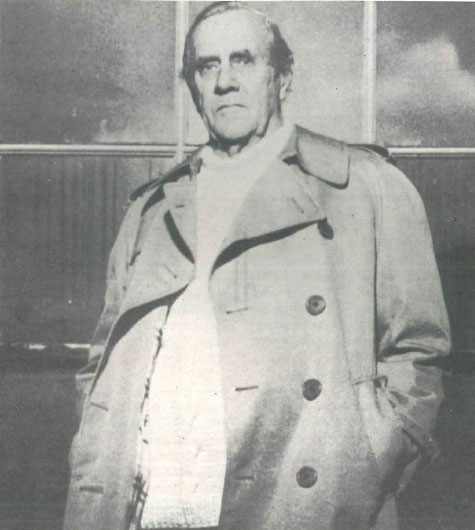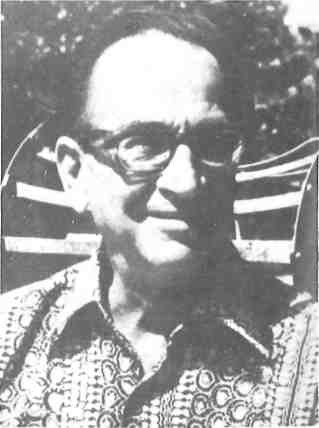
Patrick White’s reluctance to don the mantle of literary giant led to uncharacteristic reticence on the part of the Australian media in reporting his death on 1 October. Chastened by what one journalist called White’s “strained relationship with the press,” a full five hours was allowed to elapse before any newspaper was prepared to confirm the Australian Broadcasting Corporation’s tentative announcement of his death.
His refusal to pander to the media, or to any of the ‘literary vultures’ who hounded him into the self-caricature Phillip Larkin called “pretending to be me”, stemmed from a deep-seated belief that truth is the property of silence. Not even the baroque quality of his prose – what Patrick White called “bedecking myself in words” – ever obscured the austerity of what amounted to a religious quest.
Patrick White was born on 28 May, 1912 in London, during his parent’s two-year honeymoon in Europe. They returned to Australia when he was six months old, and settled in Sydney near the harbor in a house which figures in several of White’s novels. After a few years at an exclusive boarding school, he was sent to Cheltenham College in England, where it was thought that “the climate would be temperate and a colonial acceptable.” Neither proved true, and after four unhappy years, he returned to Australia, only to discover that he had become a stranger in his own country: “I had acquired too much European veneer, and was too young and inexperienced to practice tolerance.”
A year was then spent working on family sheep stations in New South Wales, and in 1932 he went to Cambridge where he read Modern Languages at King’s. After graduating in 1935, an allowance from his father enabled him to set himself up as an author in London, and in 1939 his first novel, Happy Valley, was published by Harrap.
During the war he served with the Royal Air Force as an intelligence officer in the Middle East and it was at a party in Alexandria that he met Manolis Lascaris, an Egyptian Greek who was to become his lifelong partner until his death last month. This “small Greek of immense moral strength” provided a central mandala to what Patrick White described as a “hitherto messy life”. It also gave him an insight into Greek culture – the Orthodox fatality which served as an antidote to the sterility he was coming to associate with “undiluted Anglo-Saxon blood.”

Greece became a second home for Patrick White. In his autobiography, Flaws in the Glass, he describes the “one, long, despairing rage” which, as an unblinkered philhellene under the wing of the Lascaris family, this country intermittently aroused in him. In the aftermath of war, he saw the Parthenon as “the symbol of everything I or any other solitary artist aspired to.” Yet over the years, as he and Manolis Lascaris divided their time between Greece and Australia, each suffering torments for the failings of his own country, he grew increasingly disenchanted by what he saw as the betrayal of Greek peasants:
“Never were there such victims of progress as contemporary Greeks. Peasants who sold their fields in Thessaly and Thrace live like battery fowls on their steel and concrete balconies, or expose themselves to television in the cells behind… They tell themselves they are happy, stuffed with macaroni, fried potatoes and barbecued meat. The human contacts of village life are of the past, along with those tough, golden classic hens, scratching freely amongst the dust and stones.”
After the war, Patrick White was tempted to settle in Greece but partly to spare Manolis’ family the incongruity of their setting up house together, and also to avoid turning into the “beachcomber all foreigners become when they settle in Greece – tolerated, but never more than a joke,” he returned to Australia in 1948.
There, Manolis joined him on a small farm outside Sydney, where for 16 years, “waist-deep in weeds”, the two of them struggled to grow flowers and vegetables, and to breed goats and Schnautzer dogs for sale. Plagued by recurring bouts of asthma, Patrick White nevertheless, wrote three of his finest novels at Castle Hill: The Tree of Man, Voss, and Riders in the Chariot.
The Tree of Man has been compared to Lawrence’s The Rainbow, a sombre Australian epic recounting the story of one couple’s growing up in a growing land while Voss, considered by many to be his greatest achievement, is based on the life of the German explorer, Leichardt, who, with a group of men penetrated the Australian outback in a difficult and desperate journey. It is a novel which explodes the rhetoric of the pioneering spirit, demonstrating how visions of self-aggrandizement lead only to destruction. It has also been greatly misunderstood. In a 1982 radio interview with Michael Billington, White announced: “I hate Voss. I don’t want to think or talk about Voss; it got into the hands of the wrong people, and it attracted gush.”
Riders in the Chariot, and The Solid Mandala, begun in 1964 when he and Manolis Lascaris moved to Sydney, mark White’s increasing preoccupation with society’s eccentrics – outcasts and visionaries who show that purity of heart often surfaces in unexpected place. In The Vivisector, 1970, The Eye of the Storm, 1973, and A Fringe of Leaves, 1976, the pursuit of integrity is in the hands of the artist and the innocent: a host of anonymous fringe-dwellers whose commonplace lives unfold against a moral landscape of relativism and self-interest.
The repression Australian society demands of homosexuals may explain the secretive strain which runs through these characters. While Patrick White never suffered the agonies of chosing his sexuality – “I was chosen, as it were” – he recognized the limitations imposed on homosexuals in an aggressively heterosexual country. More importantly, however, it provided him with insights into a human nature which he felt might otherwise have been denied him: “I would not trade my halfway house, frail as it may be, for any of the entrenchments of those who like to think themselves unequivocal.
“Similarly, his religious beliefs lie in a half-way house whose stability owes much to the Orthodox faith of Manolis Lascaris:
“The Greeks have survived through their Orthodox faith, professed or submerged. It is also why an unlikely relationship between an Orthodox Greek and a lapsed Anglican egotist agnostic pantheist occultist existentialist would-be though failed Christian Australian has lasted forty years.”
Eschewing the indiscriminate love of Christian agape – “in the end as destructive as hatred” – he felt that any intimations of divine love, for him at least, were “interwoven with my love for the one human being who never fails me”, while in just the same way, Manolis’ Greek pragmatism, “governed by a pureness of heart which I lack”, helped temper White’s Anglo-Saxon quest for absolutes , “the pursuit of that razor-blade truth which has turned me into a slasher.”
Patrick White was never a ‘true’ Australian; a residual patrician air still clung to him as a result of a British education and extensive travels in Europe. Nevertheless, his return to Australia was a conscious one, and for the next 40 years allowed him to hold up a mirror, in which, according to the critic Dorothy Green, “he saw himself and his fellow-Australians not only as they were, but as they might be if they responded to the challenges of the land they had invaded, and refused to be led like sheep.”
As a young man, White was apolitical “too well-entrenched behind (his) own egotism and (his) father’s allowance to embrace communism”, so that the rise of fascism and the Spanish civil war of 1936 made little impact on him. However, a mounting disgust with the rot he saw spreading through Australian society – triggered initially by a threat to his immediate environment -goaded him out of his political seclusion, and in 1972 he aligned himself with the Builders’ Labourers’ Union.
From this moment onwards he became an active republican, speaking out in his “dry, precise voice” against Australia’s links with the US and Britain, and in favour of a new Constitution which would sever any remaining ties with the British monarchy, whom he called “The Royal Goons”.
In 1973, Patrick White was awarded the Nobel Prize for literature. In what many saw as a spirit of churlishness, he refused to collect the award himself, and the distinguished Australian painter, Sidney Nolan, travelled to Stockholm in his place. While not a modest man – “jealous, vain, and unforgiving” is how he once described himself – it was the fundamental conviction that his novels were merely “an offering in the place of other gifts” that prevented him from participating in the “Nobel circus”.
The American writer, Saul Bellow, himself a Nobel Prize winner, once remarked that the 20th century is unlikely to have produced a hundred literary geniuses. In spite of Patrick White’s steadfast refusal to see himself as one of the century’s great writers, his universality of theme, combined with a startling use of language created “out of the rocks and sticks of words,” makes it difficult to agree.
His critics accuse him of obscurity, of carrying Joyce’s stream-of-consciousness “to almost its ultimate extreme.” Nevertheless, White never saw himself as an intellectual: “I don’t set myself up as an intellectual. What drives me is sensual, emotional, instinctive.” Both visionary and rationalist, his prose veers between matter and spirit, exalting the profane (“well nuns do fart, don’t they?”) and giving free reign to the nostalgie de la boue which a fastidious century has either glorified or denied. What saves him from preciousness is his coherence, the lyrical passages deflated by colloquialisms, and an unerring ear, amounting to genius almost, for those instances when a silence can say more than words.







